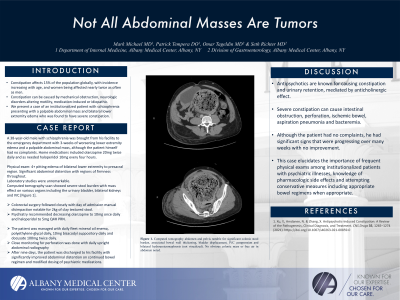Tuesday Poster Session
Category: Colon
P3157 - Not All Abdominal Masses are Tumors
Tuesday, October 24, 2023
10:30 AM - 4:00 PM PT
Location: Exhibit Hall

Has Audio

Mark P. Michael, MD
Albany Medical Centre
Albany, NY
Presenting Author(s)
Mark P. Michael, MD1, Patrick J.. Tempera, DO2, Omar Tageldin, MD2, Seth Richter, MD2
1Albany Medical Centre, Albany, NY; 2Albany Medical Center, Albany, NY
Introduction: Constipation affects 15% of the population globally, with incidence increasing with age, and women being affected nearly twice as often as men. Constipation can be caused by mechanical obstruction, neurologic disorders altering motility, medication induced or idiopathic. We present a case of an institutionalized patient with schizophrenia presenting with a palpable abdominal mass and bilateral lower extremity edema who was found to have severe constipation.
Case Description/Methods: A 38-year-old male with schizophrenia was brought from his facility to the emergency department with 3-weeks of worsening lower extremity edema and a palpable abdominal mass, although the patient himself had no complaints. Home medications included olanzapine 20mg twice daily and as needed (PRN) haloperidol 10mg every four hours (Q4H).
Physical exam was notable for 4+ pitting edema of bilateral lower extremity to groin and significant abdominal distention with regions of firmness throughout. Laboratory studies were unremarkable. Computed tomography scan showed severe stool burden with mass effect on various organs including the urinary bladder, bilateral kidneys and IVC [Figure 1]. Colorectal surgery was consulted and the patient underwent manual disimpaction in the operating room notable for 2kg of clay textured stool. Psychiatry was consulted and recommended decreasing olanzapine to 10mg once daily and haloperidol to 5mg Q4H PRN. The patient was subsequently managed with fleet mineral oil enema daily, 17g polyethylene-glycol daily, 10mg bisacodyl suppository daily and docusate 100mg twice daily. Close monitoring for perforation was done with daily upright abdominal radiography, notable for improvement in colonic distention. After nine days, the patient was discharged to his facility with significantly improved abdominal distention on strong bowel regimen and modified dosing of his psychiatric medications.
Discussion: Antipsychotics are known for causing constipation and urinary retention, mediated by anticholinergic effect. Severe constipation can cause intestinal obstruction, perforation, ischemic bowel, aspiration pneumonia and bacteremia. Although the patient had no complaints, he had significant signs that were progressing over many weeks with no improvement. This case elucidates the importance of frequent physical exams among institutionalized patients with psychiatric illnesses, knowledge of pharmacologic side effects and attempting conservative measures including appropriate bowel regimens when appropriate.

Disclosures:
Mark P. Michael, MD1, Patrick J.. Tempera, DO2, Omar Tageldin, MD2, Seth Richter, MD2. P3157 - Not All Abdominal Masses are Tumors, ACG 2023 Annual Scientific Meeting Abstracts. Vancouver, BC, Canada: American College of Gastroenterology.
1Albany Medical Centre, Albany, NY; 2Albany Medical Center, Albany, NY
Introduction: Constipation affects 15% of the population globally, with incidence increasing with age, and women being affected nearly twice as often as men. Constipation can be caused by mechanical obstruction, neurologic disorders altering motility, medication induced or idiopathic. We present a case of an institutionalized patient with schizophrenia presenting with a palpable abdominal mass and bilateral lower extremity edema who was found to have severe constipation.
Case Description/Methods: A 38-year-old male with schizophrenia was brought from his facility to the emergency department with 3-weeks of worsening lower extremity edema and a palpable abdominal mass, although the patient himself had no complaints. Home medications included olanzapine 20mg twice daily and as needed (PRN) haloperidol 10mg every four hours (Q4H).
Physical exam was notable for 4+ pitting edema of bilateral lower extremity to groin and significant abdominal distention with regions of firmness throughout. Laboratory studies were unremarkable. Computed tomography scan showed severe stool burden with mass effect on various organs including the urinary bladder, bilateral kidneys and IVC [Figure 1]. Colorectal surgery was consulted and the patient underwent manual disimpaction in the operating room notable for 2kg of clay textured stool. Psychiatry was consulted and recommended decreasing olanzapine to 10mg once daily and haloperidol to 5mg Q4H PRN. The patient was subsequently managed with fleet mineral oil enema daily, 17g polyethylene-glycol daily, 10mg bisacodyl suppository daily and docusate 100mg twice daily. Close monitoring for perforation was done with daily upright abdominal radiography, notable for improvement in colonic distention. After nine days, the patient was discharged to his facility with significantly improved abdominal distention on strong bowel regimen and modified dosing of his psychiatric medications.
Discussion: Antipsychotics are known for causing constipation and urinary retention, mediated by anticholinergic effect. Severe constipation can cause intestinal obstruction, perforation, ischemic bowel, aspiration pneumonia and bacteremia. Although the patient had no complaints, he had significant signs that were progressing over many weeks with no improvement. This case elucidates the importance of frequent physical exams among institutionalized patients with psychiatric illnesses, knowledge of pharmacologic side effects and attempting conservative measures including appropriate bowel regimens when appropriate.

Figure: CT radiograph of abdomen and pelvis notable for significantly distended colon with circumferentially thickened walls, severe stool burden and displaced bladder.
Disclosures:
Mark Michael indicated no relevant financial relationships.
Patrick Tempera indicated no relevant financial relationships.
Omar Tageldin indicated no relevant financial relationships.
Seth Richter indicated no relevant financial relationships.
Mark P. Michael, MD1, Patrick J.. Tempera, DO2, Omar Tageldin, MD2, Seth Richter, MD2. P3157 - Not All Abdominal Masses are Tumors, ACG 2023 Annual Scientific Meeting Abstracts. Vancouver, BC, Canada: American College of Gastroenterology.
